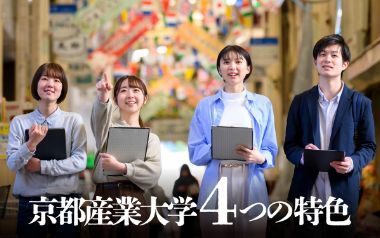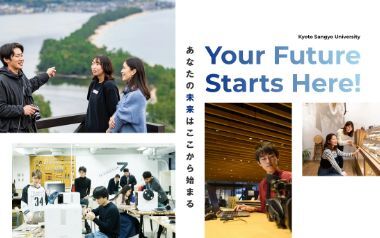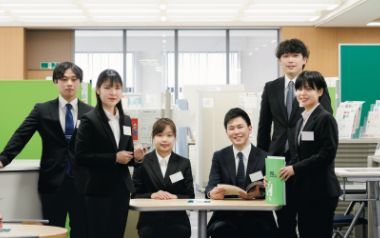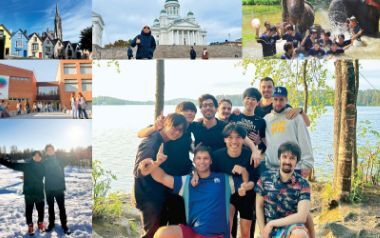学部長メッセージ
「国際関係学の専門知識と現場感覚を武器に世界へ」
大学では学問領域に世界を分けて扱う知的分業体制があります。政治を扱うのは政治学部、経済なら経済学部といったように、人類にとって重要な領域にはそれを専門とする学部があります。
これから大学に進学する場合、何に興味があるかによってどの学部を選択するかが決まっていくわけです。ただ、関心が複数の領域にまたがることもあるでしょう。そうした場合、単一の学問領域にきれいに収まらない国際関係学部のような学部を選択するといいかもしれません。
国際関係学は内容的にも学問分野的にも既存の境界を超えるものです。気候危機や人の移動、勢力均衡や地域統合など国境を越える課題はまさに国際関係学が注目するものです。また、こうした課題は一つの学問領域に収まるものではありません。人の移動といったテーマを理解するには国家間の所得格差や労働市場の状況、社会における新旧市民の関係性、移住者の権利や受け入れをめぐる国家や国際機関のやりとりなどに目を向ける必要があります。これは一例でしかありませんが、国際関係を理解するには、政治学や社会学や経済学の視点を用いることが必要ですので、学問分野の境界線をいわば越境する学問でもあります。
ところで、京都産業大学の国際関係学部の特徴ですが、本学部はまさに上記のような政治学や経済学や社会学を横断する学際的な社会科学が学べる学部です。他大学によくある、英語やその他の言語の習得を重視する外国語学部的な「国際系」学部ではありません。今の時代を捉えるための国際関係学という学問分野の修得を重視し、英語や外国語はそれを助ける道具として位置付けられています。
加えて、本学部は多くの現場を体験する機会を学生に提供しています。学問的知識を身につけると同時に、それを実世界で試すことが大切だと考えています。学びには理論も実践も、どちらも必要です。一年次から全員が「海外フィールドリサーチ」を履修し、2年次以降は「国際キャリア開発リサーチA,B,C」といった海外インターンシップ科目や長期留学にチャレンジしたり自分で構想する研究プロジェクト「インディペンデントリサーチ」に取り組んだりして、さまざまな世界のさまざまな現場での体験を積むことのできるカリキュラムとなっています。さまざまな分野からの実務家による講演なども多く、現場の声を生で聞くことで学生がキャリアの選択肢を意識するようにしています。
政治や経済や社会のグローバル化が進む中で世界はますます複雑化しています。この世界のさまざまな職場で活躍できる、理論と実践の両方を備えた学生を育てる学部です。
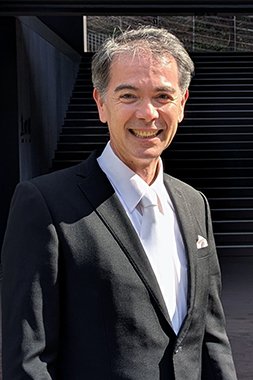
マコーマック ノア ヨシナガ 学部長
Welcome to the Faculty of International Relations
Noah McCormack
April 2025
Universities are characterized, typically, by an intellectual division of labor that divides the world between separate academic disciplines that each deal with significant domains. Politics is for faculties of politics, and economics for faculties of economics, and so on. Thus, what domain you are interested in tends to determine the faculty that you choose to study in. However, you may be interested in more than one domain. In such a case, you may be interested in faculties that don't fit neatly into a single academic domain, such as those specializing in international relations.
The study of international relations involves border-crossing in terms of both content, and academic disciplines. International relations covers topics such as the climate crisis, the balance of power, and regional integration, which are typical cross-border international and transnational phenomena. Also, the study of these kinds of phenomena is not contained within any single academic discipline. To understand human movement, you need to pay attention to wealth gaps between states and labor market conditions. You also need to pay attention to relations between newcomers and others in daily life, as well as debates involving states and international organizations concerning migrant rights and settlement policies and so forth. This is only one example, but it serves to show how understanding international relations requires the use of multiple perspectives borrowed from politics, economics, sociology, and so on. What are the characteristic features of the Faculty of International Relations at Kyoto Sangyo University? Well, firstly, we specialize in the kind of academic international relations outlined above. You may think that this should hardly need stating, however let me add that in this regard, we are unlike quite a few Japanese universities with "international" faculties that are in fact primarily for foreign language acquisition and cultural competence. We are focused very much on the acquisition of transdisciplinary academic knowledge for understanding today's world, with English and other foreign languages being a useful tool for that purpose.
Additionally, our faculty provides students with a wide range of options for students to engage in on-site learning. The acquisition of academic knowledge is thus paired with opportunities for testing and refining that knowledge in the field. All students must study abroad at the end of their first year in a field research program funded by the university. From second year onwards, students have the option of participating in overseas career development internships, long-term overseas study, or independent research projects. We also have a wide range of speakers from corporate, non-profit and state organizations, to help students broaden their perspectives and inform their career planning.
In short, we foster students with both theoretical learning and field experience, empowering them to build careers in diverse global workplaces in an era of accelerating globalization, conflict, and complexity.

